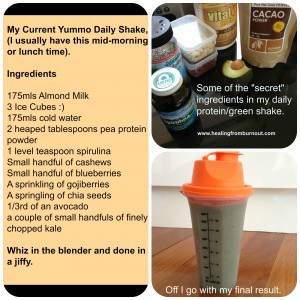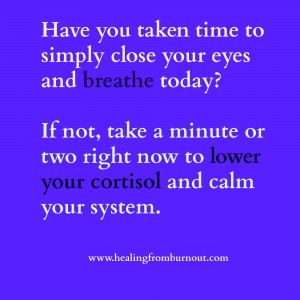
My adrenal fatigue recovery process was a big game of trial and error. At the beginning I didn’t even know what was going on with me. Through my research and with what I was experiencing I came to understand what was working and what wasn’t.
Here are 20 adrenal fatigue recovery lessons that show the decisions I was making in my everyday life about what I needed to do while recovering from adrenal fatigue.
WHAT I TRIED DID IT WORK? CONCLUSIONS
√ or ×
1. Kundalini Yoga. Did it work? √
The majority of the kundalini yoga practices were restorative and energising on my system and were a really helpful form of exercise when I wasn’t able to do much.
2. Lifting Weights. Did it work? ×
This was far too taxing and caused an adrenal “crash” in the early days of me trying it, i.e. I couldn’t function for a few days afterwards, with no energy and I needed bed rest.
3. A visit to the homeopath in the early days. Did it work? √ and ×
The homeopath I saw didn’t have a great knowledge of adrenal fatigue. However, this ended up serving me, because at my lowest point when my system was struggling the most, I didn’t end up taking a lot of supplements. This is a good thing as a really compromised system doesn’t tend to easily process an overabundance of supplements.
4. Eating the same diet I had eaten before my system began to crash with adrenal fatigue. Did it work? ×
I had a huge negative response with eating gluten, dairy, wheat, sugar, white flour, caffeine. My level of sensitivity to food became like nothing I had ever experienced before. While I had in previous years begun to make some dietary changes, I had to take it to a whole new level.
My motivation was high to give up the above things because I was experiencing so much discomfort with blood sugar imbalances, diarrhoea, gas, bloating, cramping and nausea.
5. Doing my own research. Did it work? √
Back in 2010, when I crashed, I could not find a doctor or health practitioner who was really able to help me. Through my own research, I diagnosed my own adrenal fatigue and eventually then did find a naturopath who had some knowledge (although I seemed to know almost as much as she did on the topic).
Having blood tests to rule out other possible health issues was a good thing, as I then knew through my own research and what I was experiencing, what I was going through.
 6. Creating a whole new calm rhythm to my life. Did it work? √
6. Creating a whole new calm rhythm to my life. Did it work? √
Completely changing the whole rhythm of my day, my week, my LIFE, to incorporate things that were calming on my system was extremely positive.
I incorporated meditation, yoga (restorative, kundalini or adrenal yoga), visits to the beach – sitting or strolling, colouring mandalas, reading, essentially doing quiet activities that I enjoyed.
7. Taking advice from family members, friends and acquaintances who didn’t understand adrenal fatigue. Did it work? ×
Zero result with this.
Just don’t do it.
Go to professionals who understand adrenal fatigue on a very deep level, and trust what you know you are feeling within your system.
Oh and probably a good idea to leave the endocrinologists out. They don’t believe in adrenal fatigue and will only tend to listen if you are suffering from addisons disease or cushings syndrome which are cases in which the adrenals have near lost their ability to function. If you do want to do this, please ask them what their take on adrenal fatigue is.
8. Spending time on technology late at night when I had energy for the first time all day. Did it work? ×
This contributed even more to a great disruption in my sleep pattern. It affected the quality and quantity of my sleep, when it was already compromised. I discovered that it was essential to shut down technology at least an hour or two before bed, and to ideally take an evening off or a day off without any technology use.
9. Going out in the evening after working during the day.
Did it work? ×
I had to choose each day what I could focus my energy on. If I had to work, it had to be a quiet evening in. If I was going to spend some time with friends, it needed to be on a day when there was nothing else on.
I had to conserve my energy and focus it carefully.
 10. Always taking a snack with me wherever I went that included protein, complex carbs and fats. Did it work? √
10. Always taking a snack with me wherever I went that included protein, complex carbs and fats. Did it work? √
No matter how short a time I may have been going out for, I had to take a quality snack with me. In the early days, my blood sugar had the potential to drop quickly and unexpectedly.
This is because stress creates high cortisol and as a result high blood sugar. The negative result is a big see-saw effect with high and low blood sugar levels. I learned that I had to have something with me at all times. Over time, my blood sugars did stabilise.
11. Not rushing. Not for anyone or anything. Did it work? √
I learnt to take my time, to allow extra time to get ready. And to even cancel things I had planned on if it all felt too much.
12. Pushing through and just getting something done quickly before I rested. Did it work? ×
This was a really tough one for me. I have previously been someone who wants to get through that to do list. I learned that the to do list simply had to wait. Rest first, wait until there’s some energy and then do a few things. If the energy didn’t come in the time frame I desired, I learned to just leave things for a while, especially stuff that really wasn’t urgent.
13. Getting support. Did it work? √ and ×
I say √ and × here because while yes I did get support especially from friends, in hindsight, I feel I relied far too much on 1 or 2 close friends. Adrenal fatigue is a tough thing for those close to you to endure with you.
I feel a wide and varied team of support would have been more helpful for me, so there would have been someone around who was fresh and able to help me deal with the current issue I was experiencing.
14. Eliminating the stressful situations in my life. Did it work? √
There were some extremely dysfunctional situations in my life that were not working for me. I needed to end a relationship, liquidate a business and go bankrupt. While the process propelled me into adrenal fatigue, I had to eliminate what I knew was absolutely not working.
15. Over time, learning to look at “stress” in a different way.
Did it work? √
I began to learn to look at situations in my life a different way, and instead of asking, “why is this happening to me”, I began to ask a better quality question of “what do I need to learn from this situation?”.
This is an ongoing process and it can take time to form new neural pathways in your brain, but the commitment to this over months and years is well worth it for the positive outcomes over time.
16. Looking at the patterns within me that created the burnout.
Did it work? √
I worked with a counsellor and also did a lot of writing of my own, to help me get to the bottom of why I was allowing others to control my life. This was one of the most essential aspects of being able to recover.
17. Allowing others to try and fix the surface symptoms.
Did it work? ×
An example, there was a situation where I was given a herbal supplement from a friend for the depression I was feeling. I had not asked for it. The thing is I knew that the depression I was experiencing was a knock on effect of the adrenal fatigue and the hormonal imbalance in my body.
I felt like some people in my life were desperate for me to get rid of the “mood” and for me to “get over this quickly”. Digging deep into what issues were at the core – physically and emotionally was the real way I got to the root of what was going on. Trusting what felt right for me was #1.
18. Speaking up for what I needed at work. Did it work? √
I was doing some massage work in the corporate arena at the time which was extremely draining for me. However, I needed to just get by in the short term. I learnt to speak up and say that I needed longer break times. This was honoured and adjusted for me, and helped me a lot to get through what I had to do.
 19. Not moving my body at all. Did it work? ×
19. Not moving my body at all. Did it work? ×
I noticed on the days that I did nothing at all and lay slumped on the sofa that my energy was even lower. This was partly because the position of being slumped didn’t allow for enough flow of oxygen throughout my body.
One tool I used (through learning from Dr Michael Lam), was to breathe for a few minutes, several times a day, just easily and gently. I realised that even if I couldn’t move much, I could certainly breathe and build energy and strength that way to help me with the next pieces.
With my hands on my belly and sitting with a very straight back or doing it lying down if I was too tired, this allowed the oxygen to flow into my kidneys and adrenals and create a little more energy flow. In the beginning, the effects were subtle and over time more pronounced, but there was always a positive shift in my energy levels when I did this.
20. Beginning to get in touch with what I really desired for my life. Did it work? √
I realised that I had lived for so many years doing what others wanted for me and what I felt I was supposed to do and what I supposedly should do. I began to really honour what I was called to, and am now happily working towards making these empowering changes.
The energy that comes from being inspired is so vital in your recovery process. Don’t underestimated the huge benefits of an inspired you, no matter what you may be feeling with your health. Start with one step here and build on it.
Know too, that this is my experience and while some of these things will feel like a complete fit for you, others may not resonate.
Take the ideas that you like and dump the rest. This is your body, your life, your recovery process.
All my love.
Lisa.
